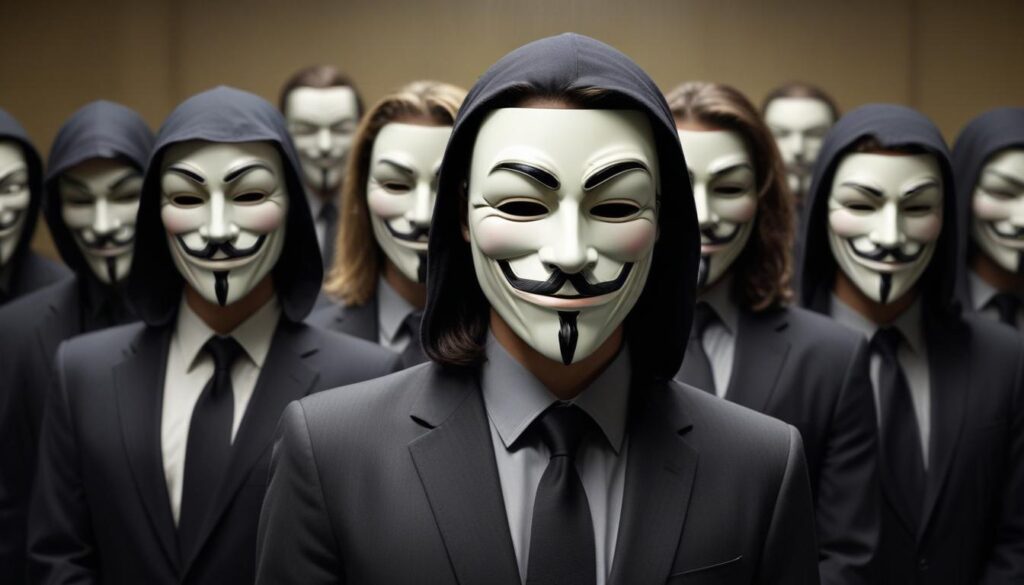In the vast and complex world of the internet, one name often stands out in discussions about hacktivism and cyber resistance: Anonymous. Known for their iconic Guy Fawkes masks and their decentralized, leaderless structure, Anonymous has captured the attention of the media, governments, and the public alike. This article delves into the origins, ideology, and notable actions of the Anonymous group, exploring how a loosely connected network of individuals has become one of the most recognized and controversial forces in the digital age.

Origins of Anonymous
The origins of Anonymous can be traced back to the early 2000s on the imageboard 4chan. Originally, Anonymous was not a group in the traditional sense but a concept. Users who posted anonymously on the platform collectively became known as “Anonymous.” Over time, this collective identity began to take on a more activist-oriented role, particularly in response to censorship and abuses of power.
The first major action attributed to Anonymous was the “Project Chanology” campaign in 2008, targeting the Church of Scientology. This campaign was sparked by the church’s attempts to remove a leaked video of Tom Cruise discussing Scientology from the internet. Anonymous launched a series of protests, both online and offline, including DDoS attacks on Scientology websites and demonstrations outside Scientology centers. This marked the beginning of Anonymous’s transformation into a hacktivist collective with a global reach.
Ideology and Structure
Anonymous is characterized by its decentralized and leaderless structure. There is no official membership, no central command, and no formal hierarchy. Instead, individuals who identify with the Anonymous ethos can participate in operations and campaigns. This lack of structure is both a strength and a weakness. It allows for a high degree of flexibility and resilience, but it also means that actions taken by individuals or splinter groups can vary widely in method and intent.
The ideology of Anonymous is rooted in principles of free speech, anti-censorship, and the fight against oppression and corruption. Their slogan, “We are Anonymous. We are Legion. We do not forgive. We do not forget. Expect us,” encapsulates their ethos of collective action and accountability. Anonymous often targets entities they perceive as abusing power, such as governments, corporations, and other organizations.
Notable Actions and Campaigns
Over the years, Anonymous has been involved in a wide range of operations, some of which have garnered significant media attention. Here are a few notable examples:
Operation Payback
In 2010, Anonymous launched “Operation Payback” in response to anti-piracy efforts by the entertainment industry. The operation began with attacks on organizations such as the Motion Picture Association of America (MPAA) and the Recording Industry Association of America (RIAA). It later expanded to include attacks on financial institutions like PayPal, Mastercard, and Visa, after these companies stopped processing donations to WikiLeaks following the release of classified U.S. diplomatic cables. Operation Payback demonstrated Anonymous’s ability to coordinate large-scale actions and highlighted their support for transparency and information freedom.
Arab Spring
During the Arab Spring uprisings in 2011, Anonymous played a supportive role by helping activists circumvent government censorship and surveillance. They provided technical assistance, including advice on how to avoid detection and methods to maintain internet access when governments attempted to shut it down. Anonymous also launched cyberattacks against government websites in countries like Tunisia and Egypt, furthering their reputation as champions of freedom and democracy.
Operation Sony
In 2011, Anonymous targeted Sony in retaliation for the company’s legal actions against George Hotz, a hacker who had jailbroken the PlayStation 3. The attacks took the form of DDoS attacks on Sony’s websites and services, which disrupted the company’s online operations. This operation highlighted Anonymous’s willingness to defend the rights of individuals against corporate interests.
OpISIS
In response to the rise of ISIS and their use of social media for propaganda and recruitment, Anonymous launched “OpISIS” in 2015. The goal of this operation was to disrupt ISIS’s online presence by identifying and reporting social media accounts associated with the terrorist group. Anonymous claimed to have taken down thousands of ISIS-related accounts, showcasing their ability to engage in digital counter-terrorism efforts.
Criticisms and Controversies
Despite their often noble intentions, Anonymous has faced significant criticism and controversy. One of the main criticisms is the lack of accountability due to their anonymous nature. This anonymity can lead to actions that are harmful or counterproductive, as there is no way to hold individuals accountable. Additionally, the decentralized structure means that anyone can claim to be part of Anonymous, leading to a wide range of actions under the group’s banner, some of which may not align with the original ethos of the collective.
Furthermore, while some of Anonymous’s actions have been lauded as heroic, others have been criticized as reckless or illegal. DDoS attacks and hacking are illegal activities, and even when used against perceived “bad actors,” they raise ethical and legal questions. Critics argue that these tactics can harm innocent people and undermine the rule of law.
Conclusion
Anonymous remains a fascinating and enigmatic force in the digital age. Their decentralized structure, commitment to free speech, and willingness to take on powerful entities have earned them both admiration and criticism. As technology continues to evolve, so too will the methods and impact of hacktivist groups like Anonymous. Whether viewed as vigilantes or digital heroes, Anonymous has undeniably left a lasting mark on the world of cyber activism.